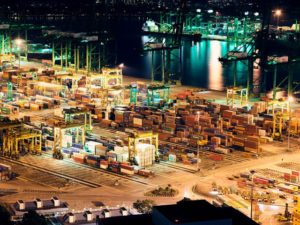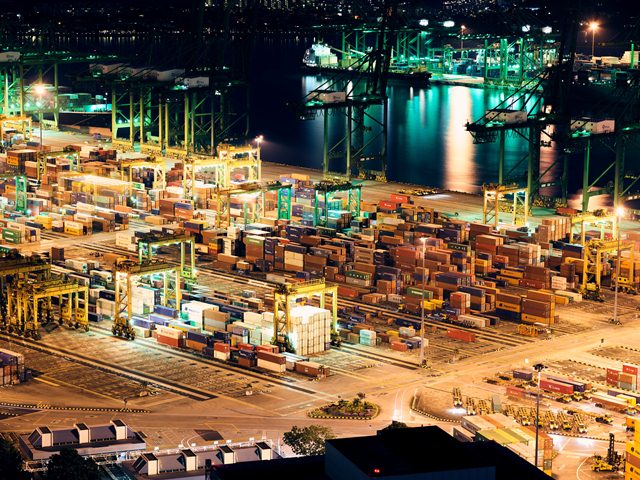 The coronavirus outbreak could not have come at a worse time for the shipping industry, which is currently struggling with the additional fuel costs from IMO 2020 and the switch to low-sulfur fuels, according to the Baltic and International Maritime Council (BIMCO).
The coronavirus outbreak could not have come at a worse time for the shipping industry, which is currently struggling with the additional fuel costs from IMO 2020 and the switch to low-sulfur fuels, according to the Baltic and International Maritime Council (BIMCO).
The organization in a new analysis outlines the possible implications for shipping companies if the coronavirus spreads at a pace greater than expected.
If the virus spread is short term and largely contained by the end of February with Chinese workers returning to work during early March, this could prompt a subsequent pick-up in manufacturing, industrial production and refinery throughput, as well as shipping demand, said the report.
In the medium-term, large-scale quarantines will continue until mid-March, but economic activity picks up and reaches a state of normalization by April-May.
In the worst-case scenario, where the spread “continues until an indeterminate point in time,” BIMCO said there are just too many “massive uncertainties” to make any long-term projections.
“Container shipping is inextricably tied to China with the main trade lanes, namely and China-Europe and China-North America, linking China’s manufacturing capabilities with the rest of the world. Now, the entire logistics chain is being disrupted,” said the report.
First, many of the producers of containerized goods have halted production or are producing at lower levels.
Second, the Chinese hinterland transportation of containers, in the shape of trucking, is in massive labor shortages. Anecdotal evidence suggests, that, in some provinces, less than 30% of the truck drivers have reported for duty.
Unsurprisingly, faced with the lower container volumes, container carriers have started large-scale blanking of sailings (cancelling them). On the Asia-North Europe trade lane, 40 sailings have been blanked in the eight-week period after Chinese New Year, compared with the 15 sailings blanked last year.
The blanked sailings have partially safeguarded the freight rates from the coronavirus as indicated by the composite SCFI index from January 23 to February 14, 2020. However, the blanked sailings will only fend off the downward pressure for so long.
BIMCO said that the virus will tighten its grip on the container market at different paces.
“The intra-Asian market will be the first to feel the blow with fewer semi-finished goods, such as parts used in car manufacturing, being transported to manufacturers in nearby countries like South Korea and Japan. Should the regional manufacturers slow production due to supply shortages, the long-haul trades will soon hereafter start to feel the pressure,” it continued.
“Currently we are seeing carriers trying to mitigate the low container volumes in Chinese ports by blanking sailings. If the situation continues, we could start to see global supply outages in retail stores. Manufacturing in Europe and North America could also start to decline, as some supply chains are reliant upon the Chinese semi-finished goods,” said Peter Sand, BIMCO chief shipping analyst.
In the short term, the long-haul trades will remain largely unaffected by the outbreak, given the capacity management measures already exercised by liner shipping.
“February traditionally brings with its declining freight rates and in this scenario, the month will unfold largely within the scope of usual seasonality. Yet, volumes will remain lower this time around, especially on the Intra-Asian trades, which could bring a minor disruptive interference to global supply chains,” said BIMCO.
In the medium term, more dark clouds will start to gather. A temporarily obstructed active labor force, caused by a continued widespread quarantine, will extend disruptions to manufacturing, hinterland transportation and port operations. Given the lower container volumes, caused by a halt to regional manufacturing, the disruption could extend into a global supply shortage of retail and manufactured goods.
In this case, manufacturers in Asia and rest of the world, reliant upon semi-finished goods imported from China, will have to temporarily cut production, creating a dent in manufacturing activity on a global scale.
“If that happens, container ship freight rates and time-charter rates will come under massive downward pressure. However, in this scope of influence, the effects will only be transitory, and we are likely to see a gradual rebound back to normal market conditions after weathering the storm,” said the report.
BIMCO said that one aspect has become painstakingly clear: the fragility of global supply chains.
“The US-China trade war served as the tinder, but perhaps the coronavirus will be the match that ignites a larger scale restructuring and diversification of global supply chains to other Asian countries and beyond including increased near-shoring,” it added.
“The outbreak of the novel coronavirus has illustrated just how dependent shipping has become on the Chinese economy. If large parts of Chinese labour force are quarantined, the commercial shipping segments will be stuck in gloomy territory.”
Photo by chuttersnap on Unsplash





